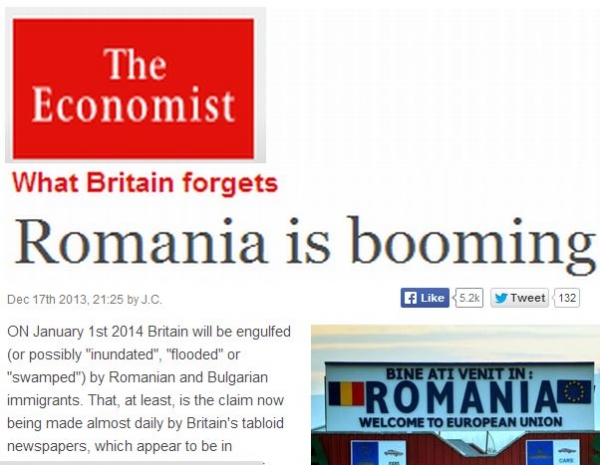Romania is booming - citeste IN ORIGINAL textul aparut despre ROMANIA in The Economist

ON 1st January 2014, Britain will be engulfed (or possibly "inundated", "flooded" or "swamped") by Romanian and Bulgarian immigrants. That, at least, is the claim now being made almost daily by tabloid newspapers, which appear to be in paroxysms of panic about the approaching expiry of transitional controls on nationals of those two EU member states. Many fewer Romanians and Bulgarians will come to the UK than the press implies (not hard: some reports cite the 29-million-strong combined population of those two countries as if it were an estimate of arrival numbers). Still, David Cameron has made a series of media interventions over the past few weeks designed to assure Britons that he is as petrified as they are. Theresa May, the home secretary, has been even tougher in her comments.
Quite aside from the benefits of EU immigration (covered in The Economist last week), part of the story is almost entirely absent from the media coverage: Romania's accelerating economy. Earlier this year, for example, The Mail sent a reporter to speak to some Romanians in their “tiny clay hut”. The finished story, under the headline “by January, the only thing left will be the goat,” gives some indication of how Romania is portrayed in the tabloids. Yet the country is wealthier, more dynamic and more sophisticated than such stories suggest. Unemployment there is relatively low (and lower than in Britain). Its budget deficit puts Britain to shame. The government is in the midst of liberalising the economy, opening up new sectors (most notably, energy and telecoms) to competition and investment. Economic growth is at 4.1%. Wages are rising fast. Adjusting for prices, Bucharest’s GDP per capita is above the EU average. Indeed, the average Bucharest resident is comfortably better off than the average resident of Manchester.
This forgotten story is an important antidote to Britain's panic. First, it shows the press is overstating the “push factors” encouraging Romanians to leave for Britain. Second, and most importantly, it shows that the benefits of Romania's EU membership are mutual: British individuals and companies can benefit from travelling in an opposite direction to the "wave" of migrants expected on January 1st.
A feature in Ziarul Financiar (a respected Bucharest business daily) today makes that point well. This argues that although “Britons do not want Romanians,” they are keen on Romanian consumers. Between 2010 and 2013 British firms did an average €6.3 billion of business annually there, double the level of 2007, when it joined the EU. Since its accession, Romania—considered one of Europe’s few “tiger” economies—has been worth some €27-30 billion in turnover and €3.7 billion in profit to companies based in Britain. Several have even received multi-million-euro subsidies from the Romanian state (worth remembering when politicians bang on about Romanians costing British taxpayers money). And the true benefit may be even greater, as these numbers ignore British companies active in Romania but listed elsewhere—like Vodafone, which (for the purposes of Romania’s trade statistics) counts as Dutch.
The article also notes that London, as Europe’s leading financial centre, has benefited from Romania's economic emergence. Two of its major companies—A&D Pharma and ROMGAZ—have listed in Britain’s capital in recent years, generating millions in fees for the London-based banks, lawyers and consultants that they hired.
This highlights another riposte to the tabloids and government ministers. Not only do migrants work hard and boost the Britain’s economy. Not only does Romania’s EU membership give British companies a free run at the country’s economic boom. But Romanians in Britain create links with their home country, linking together the two positive trends. Few Britons speak Romanian (precious few even speak German) and few understand how that country works. That might act as a brake on Britain's economic links with this boom economy, were it not for Romanians in London, Manchester, Birmingham and elsewhere who can open new channels of communication and trade. For Britain, which aspires to export 60% more to Romania by 2017, that can only be a good thing. British politicians who fret about spurious immigration projections while championing their country's place in a "global race" should take note.



